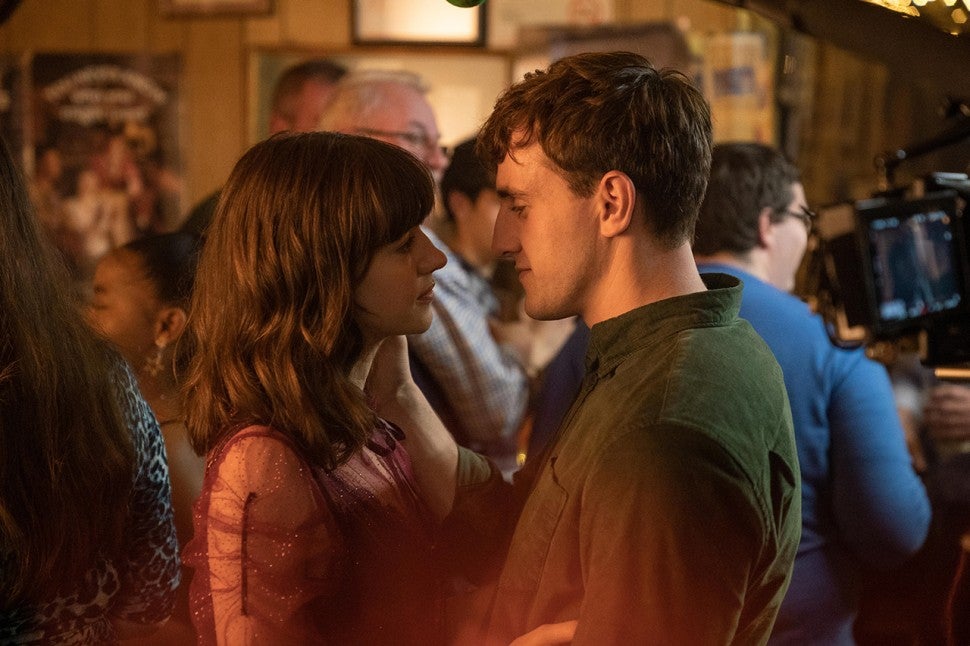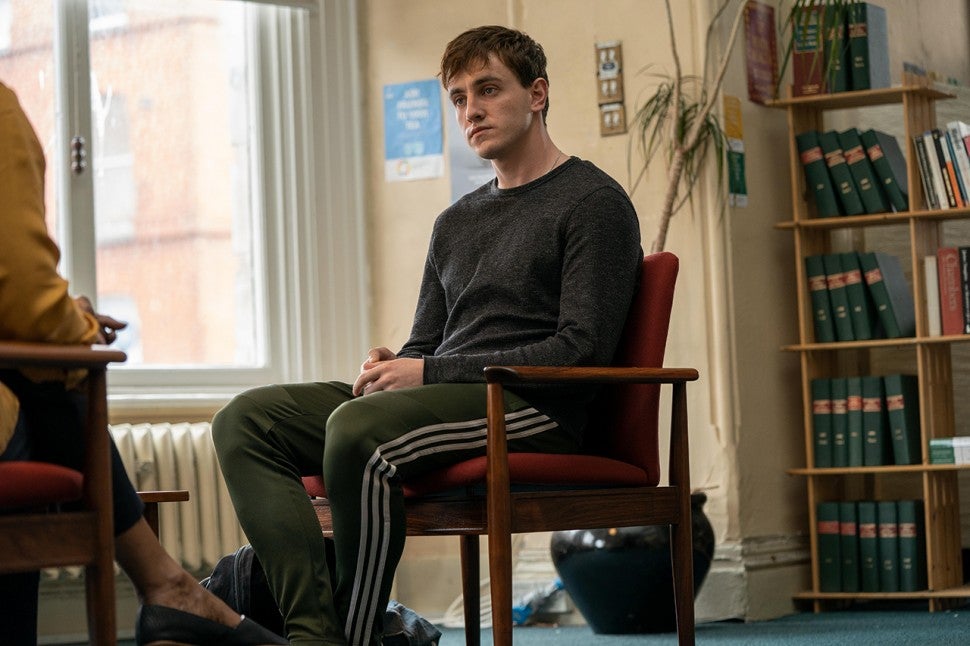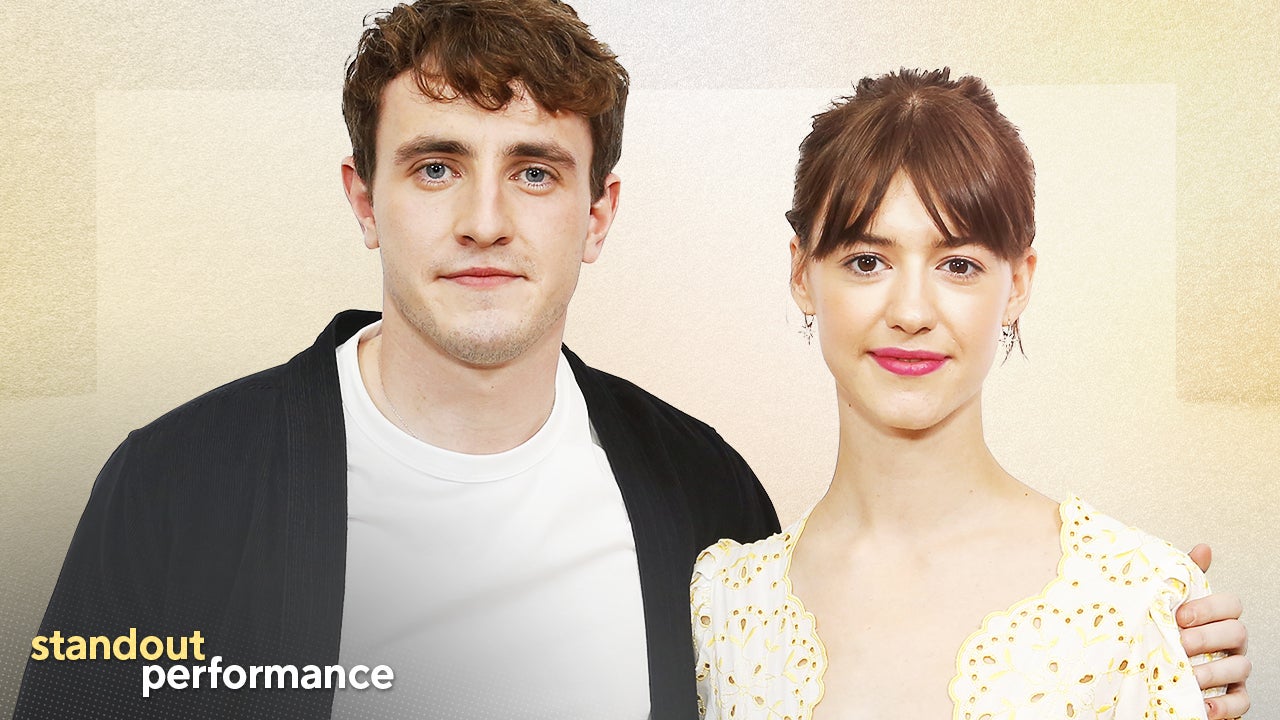Two months after the world became enamored with Hulu's limited series Normal People, young leads Daisy Edgar-Jones and Paul Mescal are tucked home safe and sound in London, England, adapting to the newfound spotlight and a life in quarantine. It's a far cry from just a few months earlier when the relative unknowns were whisked off to Los Angeles, California, to wax poetic about a show the public didn't know they'd fall in love with yet. In many ways, their quick ascension was written in the stars.
In just 12 half-hour episodes, Edgar-Jones and Mescal transformed author Sally Rooney's cherished literary characters, Marianne and Connell, from intangible spirits that lived solely on the page to living, breathing human beings with painful, heartbreaking histories and winding paths. Their realistic, simplistic, delicate performances of two people caught in the depths of ecstasy and despair that only first loves can create fueled much of the series' palpable magic. Whether it was enduring Connell's internal agony as he tearfully broke down in therapy following a childhood friend's suicide or understanding the root of Marianne's lack of self-confidence stems from her toxic family or their eventual breakup in the final episode, Edgar-Jones and Mescal bared their souls -- quite literally -- for all to see.
Recommended Videos
At only 22 and 24 years old, respectively, Edgar-Jones and Mescal have their best years ahead of them in Hollywood, if they so choose. But Normal People, they both say, is a high marker that future projects will be hard-pressed to live up to. "It'll be one that we'll definitely look back on and probably be talking about for a long time. How lucky are we? I can't imagine myself ever not being proud of this show because I know how hard it was to make it," Mescal says by video chat alongside his co-star on a Tuesday in June. "It's very representative of the work I'd love to do for the rest of my life," Edgar-Jones muses, calling herself "incredibly lucky to have worked with an actor as amazing as Paul." "I don't know if I'll ever be as lucky again."
Over the course of a 20-minute conversation, Edgar-Jones and Mescal -- both Emmy contenders in the lead acting in a limited series categories -- pick each other's standout scenes on Normal People, address Marianne and Connell's ambiguous ending and explain why a popular social media meme, inspired by Connell's silver chain necklace, is the ultimate indicator of the show's undeniable impact on pop culture.
ET: What have you been doing to keep your time filled in quarantine?
Daisy Edgar-Jones: It's been really nice because the lockdown's slightly lifted a little bit here, which means we're allowed to go into people's back gardens. I've been to a couple of friends' back gardens, my parents' back garden, just sat in their garden all day. It's been lovely to say, "Yeah, I've been seeing lots of people," but really, it's been quite busy actually and it's been quite surreal because it's all been from our bedrooms. It's quite hard to break work from life when you're constantly working. What do you think, Paul?
Paul Mescal: It's been nice being allowed to see friends, obviously adhering to guidelines and things like that. That's been a very welcome relief.
As we dive into Normal People, the characters of Marianne and Connell have become the formative roles in both of your young careers. Why did you initially say yes?
Mescal: The source material is so strong. The character, there was never any kind of question or doubt. I think I can say the same for Daisy's part as well but the minute that it was offered, there was no question if it was going to be, "Will we or won't we do this?" It's interesting to see it from that side of things. The characters are so brilliant and the filmmakers attached to make it, and the format that it was in -- a half-hour series -- it was really exciting because it meant that we had time with the characters to give them their full layers.
Edgar-Jones: To be honest, for me, and Paul, I think, it was a matter of begging them to say yes to us. I would have given anything to play Marianne. Sally has touched on something very special with her book. It's so simple, really. It's just a character study of two people falling in love and growing up. Lenny [Abrahamson], as a director, is someone I've always wanted to work with. And same with Hettie [Macdonald]. I knew Sally's words would be in good hands. There's no form of acting really, it's just trying to play the truth. I think I just wanted them to say yes to me.
What was it about the characters or the world that you weren't seeing anywhere else or in other projects you were doing?
Mescal: It's a story that you've seen a lot. It's a love story, but I feel like in certain instances, those kind of things can be trivialized. Like first love could be a whimsical thing that isn't that important, but of course, in my experience and everybody else who has experienced it, it's a very serious, very formative moment in everybody's life. It was always Sally's intention, and also Lenny and Hettie's, that these teens were treated with a very serious hand. It's refreshing to get to play young people whose problems and joys aren't trivialized in any shape, way or form.
Edgar-Jones: I couldn't really put it better myself. It's exactly what Paul said. It's exciting to get the chance to play those emotions because it's something we all feel as human beings: love, loss, insecurity and growing up. The show captures how this idea of normal doesn't really exist for anyone and that's OK.
From conversations I've had with friends and colleagues, many have mentioned Normal People as a story they'll remember for a very long time. What makes this timeless?
Edgar-Jones: I think that it would've resonated with people anyway, but the fact that we're in lockdown and there's a lack of human connection that we don't realize we have every day and suddenly that's removed. Maybe that's why when you watch the show, you're so suddenly hyper aware of, oh my gosh, your friendships and connections. That it's maybe more potent to feel at the minute when that's something lacking in your life.

Instead of me asking you about specific scenes in the series, I'd like to switch things up and ask you guys to talk about a standout performance that your co-star gives. So, Paul, what is a favorite scene of Daisy's you'd like to spotlight?
Mescal:That is a great question. How long do we have? Oh, Christ...
There are a lot to choose from.
Mescal: That's the problem! I remember watching Daisy in pretty much everything in episode 9 because for the vast majority of it I was watching Daisy the whole way through on the other side of the camera. The level of consistency, not only from scene to scene but take to take, I was like, "OK, they can use every single one of those." There's the incredibly upsetting scene, but it's a close-up shot on Daisy's face when she's with Lukas and he has to tie her hands and her face just... (Mescal drops his head.) Her eyes drop and I was just like, "This is..." Just the ability to communicate that vulnerability and how upset I was, not only because I know Marianne and I know Daisy. I was aware that that was an incredibly difficult scene to shoot, but I was watching it as a fan of the show being like, "I want to wrap Marianne up in cotton balls until you can't find her." And for Daisy to be able to communicate that with a drop of her head, I was like, "That's as good as acting as you're going to see."
Edgar-Jones: Aw, thanks Paul.
Mescal: You're very welcome. I'll charge the invoice to your account.
Daisy, that episode he's referring to is so heartbreaking because you see how Marianne values herself through her toxic relationships, which stems from her. Is that one of your personal favorites?
Edgar-Jones: I remember reading that in the book and feeling desperately sorry for Marianne. But I also remember thinking how much of a challenge it would be to put that on screen. In the book, it's clear she almost feels dissociated with everything and quite detached and she's very, very, very internal. It's quite tricky to then act if you play off passing feelings. So I definitely felt that that was a challenge to try and communicate the right level of that.
When you love the character very much and you've spent a long time with them, those scenes are harder to do because you feel desperately sad because you love your character and you know that they're in a bad place. I just felt desperately sad for Marianne at the time and that was quite a hard feeling to shake off. That voice-over that's present in the episode that's played during some of the scenes was Paul's voice pre-recorded. I spent such a long time with Paul and have such a wonderful friendship with him that I felt sad listening to that, like, "Oh, I just want it to be happy Marianne and Connell." That was quite emotive and quite moving to listen to Paul saying those words.
Daisy, what is your favorite performance of Paul's?
Edgar-Jones: We're just going to be boasting Paul.
Mescal: Oh Christ.
Edgar-Jones: Paul's ability to play such range in a very small moment is the most jaw-dropping acting I've ever seen. Particularly, he would do this thing with his eyes and you can read what he is thinking from just seeing that. It's beautiful. I remember being very in awe of him, particularly from watching episode 10 [where Connell has a soul-crushing breakdown in therapy after an old friend dies by suicide]. I knew he was amazing but that performance is, I think, one of the best bits of acting I've ever seen. But we all know that's the case.
I wanted to talk about the end of episode 6 actually, which I know is something Paul is not entirely happy with, which I'm shocked by. But the scene by the pool. I remember being really moved by the way Lenny talked about the way he wanted to film it. It's the first time you get the insight of Connell's social anxiety and it's something I've experienced. And I'm watching Paul play those beautiful moments by the pool where he's looking out at the fact that everyone is socializing and you can see he's so in his own head, it's so beautiful. There's a moment when he comes over, he wants to ask Marianne a question and he doesn't. He has a little moment where you see the emotion because he can't physically get the words out. I found that so moving and it's so simple; he doesn't have to say anything and you get it.
But also, all of the humor that Paul brings. Like I love the scene where Peggy asks if Marianne and Connell would be up for a threesome and Paul does this thing where he's like [uncomfortably laughing it off]. My favorite bit of acting ever. It's just so perfectly Connell. It's sad to limit myself to any one [scene] so I just said those but there's far more.
Mescal: It's so weird because I can't dissociate my work from Daisy's, in a weird way, and I don't think that's normal because I think that's what extraordinarily good shows [do]. I think there were, like, two or three days in the entire shoot that we weren't at least doing some form of work together. And it was so weird at the end of the shoot, it was this nonverbal understanding. Before we even talked about the scenes, we knew how they were. I knew Daisy's version of Marianne and she knew the version of my Connell and how we would play these things. That's something that I look back now and think, "That was totally extraordinary." I would be so lucky to experience something like that again in my career. Actually, that's such a lovely question to be able to just gush about the other.

Connell's breakdown in therapy remains one of the series' most gut-wrenching moments. Was it difficult to be emotionally present for it?
Mescal: Yeah, that whole episode... Episodes 9 and 10 are two episodes whose thematic theme is depression and anxiety, but there are so many heartwarming moments in those two episodes where you see Marianne when she's with Lukas, that email comes on and you see even when she's at her lowest, Connell is the person that saves her and shows her that she's worth more than what she's receiving from Lukas. And vice versa when they hug in the church. That's, I think, one of my favorite moments in their relationship full stop, because it's something that they haven't prepared for. He's not expecting to see her at the funeral. It's this magnetic thing that he needs her to save him. He knows that. And she does. She totally saves his life. In the midst of all the depression of episode 10, he really, truly figures out that the person who can save him is himself, but also Marianne.
Connell's silver chain necklace has become a bit of an unofficial symbol of the show and has become a social media meme, even inspiring an Instagram account that has more than 183,000 followers. What is your reaction to the obsession surrounding the chain?
Mescal: Very much aware of it and slightly bamboozled by it. Probably the last thing we were expecting, but if it's a mark of anything... it's a mark that people like the chain. I have no idea!
The finale left on a somber note for Marianne and Connell, who have a moment of clarity when they decide to go their separate ways. Do you feel there's more to tell in their story? Are you content with where things end?
Edgar-Jones: The open ending is kind of perfect because I think those characters are so grounded in realism and it's quite realistic to not know where it goes next. That's what life is like, you never know what's around the corner. And I quite like that I don't know where they are and that they're still very much living and breathing and we don't have to say goodbye to them. But at the same time, I guess I would be curious to see where they go, maybe in their next stage of life, maybe in their early 30s or even later? I would like to see what that would bring but I guess it's up to Sally and what she wants to do. I think it's quite perfect that we don't know.
ET’s “Standout Performances” recognize the best of the 2019-2020 TV season. See more of our favorites below:
Ramy Youssef on How an Emmy Win for His Series Could Change TV
Annie Murphy Couldn't Be Prouder of Her Journey on 'Schitt's Creek'
With 'Zoey's Extraordinary Playlist,' Jane Levy Finds Her Voice
'Marvelous Mrs. Maisel': Luke Kirby on Midge & Lenny's Fiery Chemistry
Exclusive
Exclusive
Image

Byline
Tue, 06/30/2020 - 09:20



